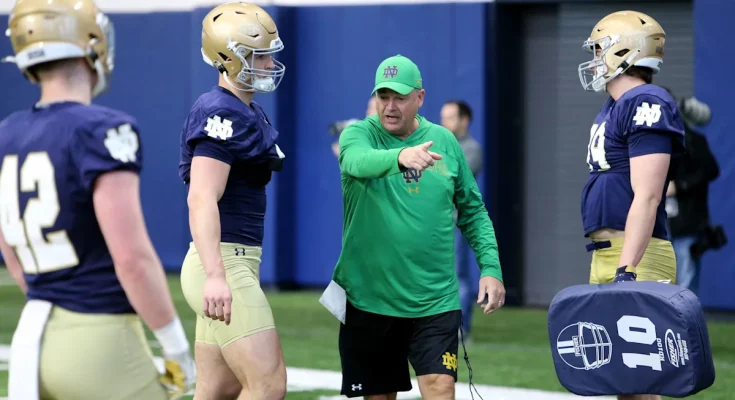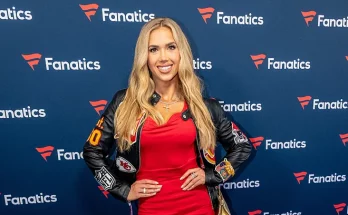When a seasoned analyst like Andy Staples speaks, the college football world listens. So when Staples, known for his deep insights and bold evaluations, placed Notre Dame’s Mike Denbrock among the nation’s top offensive coordinators, it wasn’t just a compliment—it was a declaration. For fans of the Fighting Irish and followers of high-level college football schemes alike, this recognition signals something powerful: Notre Dame is armed with not just tradition and talent, but also tactical brilliance at the highest level of the sport. Denbrock’s rise to national acclaim is no overnight story; it’s the result of years of proven development, adaptability, and a sharp football mind capable of adjusting to the ever-evolving demands of today’s game.
Mike Denbrock’s name has long been associated with success, particularly on the offensive side of the ball. His career has spanned decades, and along the way, he’s earned the trust of head coaches, the admiration of peers, and now, the acknowledgment of a respected voice like Staples. At Notre Dame, Denbrock’s fingerprints are all over the offensive resurgence. From quarterback development to creative play-calling that keeps defenses guessing, his influence is substantial. It’s not just about the plays he calls; it’s about the confidence his players have in executing them, the rhythm he establishes, and the way he balances explosiveness with control.
Returning to South Bend after his stint at LSU, Denbrock rejoined a program that he’s long been tied to. His previous time at Notre Dame, working under Brian Kelly, laid the foundation for many of the offensive principles the Irish still utilize today. But this latest chapter has elevated his coaching profile even further. After orchestrating a high-octane offense at LSU that saw quarterback Jayden Daniels blossom into a Heisman contender, Denbrock brought that same energy and innovation back to the Golden Dome. It’s no surprise then, that someone like Andy Staples, with a keen eye for football nuance, would highlight Denbrock’s ability to modernize Notre Dame’s attack without losing the physical identity the Irish are known for.
Denbrock’s offensive philosophy combines the best of both worlds. He embraces tempo when needed, yet isn’t afraid to lean on the run game to wear down opponents. His play designs open up lanes and exploit mismatches with precision, a skill he honed over years of coaching receivers, tight ends, and offensive lines. His capacity to tailor the offense around the strengths of his personnel is what sets him apart. Whether it’s leaning on a dual-threat quarterback, utilizing a tight-end-heavy package, or unleashing speed on the perimeter, Denbrock molds his playbook like a craftsman, carefully constructing a system that maximizes every inch of talent on the roster.
Perhaps the most telling endorsement of Denbrock’s value is the trust elite head coaches have placed in him. Brian Kelly brought him along to LSU because of that exact reason—his ability to orchestrate and execute a game plan at the highest level of competition. And when Notre Dame needed an OC capable of transitioning them into a new era under Marcus Freeman, they turned to someone who not only knew the program but understood its DNA. That rare combination of continuity and creativity is what has made Denbrock a rising force among college football’s elite coordinators.
Recruiting is another area where Denbrock makes a quiet but powerful impact. Offenses like his are magnets for blue-chip talent. Recruits want to be part of schemes that put up points, that develop NFL-caliber players, and that operate with precision and purpose. Denbrock’s track record checks every one of those boxes. Whether it’s mentoring quarterbacks, scheming receivers into space, or helping linemen flourish in both pass protection and run blocking, he’s built a reputation as a coach who prepares players not just for Saturdays in the fall, but for Sundays in the pros. That kind of development pedigree matters more now than ever, in an era where Name, Image, and Likeness (NIL) and transfer portal movement make long-term program building more complicated.
Still, what may stand out the most about Denbrock is how he’s stayed ahead of the curve without being defined by trends. College football offenses have seen wild shifts in philosophy over the years—from smashmouth to spread to tempo and back again—and Denbrock has evolved at every turn. He’s neither stubborn nor gimmicky. He studies the game. He adjusts. He learns. And most importantly, he listens to his players. That player-first mentality, married with a technician’s eye for detail, makes him one of the most adaptable and effective coordinators in the game.
It’s also worth noting the statistical impact Denbrock has had at nearly every stop in his career. His offenses consistently rank among the nation’s best in categories that matter: scoring offense, total yardage, third-down conversion rate, red zone efficiency. These aren’t just vanity numbers. They speak to a coach who knows how to move the chains, how to sustain drives, and how to put his team in position to win. And while he’s capable of lighting up the scoreboard, he’s just as committed to protecting the ball and winning the situational battle. That’s a level of detail that only top-tier coordinators possess—and one that Staples undoubtedly considered when placing him among the best.
Notre Dame’s hopes for returning to national title contention hinge on many factors—depth, defense, culture—but perhaps none more influential than Denbrock’s ability to build a championship-caliber offense. If he succeeds in doing so, it won’t just be a boost for the Irish; it will be a vindication of the faith that Staples and so many others have placed in him. It will be the clearest evidence yet that Denbrock belongs not only in the conversation of elite offensive minds, but at the very top of the list.
What separates a good coordinator from a great one often comes down to how they perform when it matters most. Denbrock has shown time and again that when the lights are bright and the stakes are high, his offenses don’t shrink—they shine. In bowl games, in marquee matchups, and in hostile environments, he’s delivered schemes that give his team a chance to win. It’s one thing to rack up stats against weaker opponents; it’s another to consistently out-scheme the best defensive minds in the game. Denbrock has done just that, and with Notre Dame entering a crucial season, his fingerprints will be all over their success.
Leadership, too, plays a major role in Denbrock’s value. Offensive coordinators aren’t just play-callers—they’re CEOs of a massive enterprise within the football team. Denbrock has earned the respect of every room he’s entered. Players buy into his vision. Assistant coaches trust his leadership. And head coaches give him the autonomy to do what he does best. That level of confidence doesn’t come by accident. It’s earned through years of consistency, integrity, and results.
As Notre Dame prepares to face a rigorous schedule loaded with tough defenses and playoff-level implications, all eyes will be on Denbrock to see how he maneuvers the Irish through the gauntlet. But if his past is any indication, the challenge is one he’ll embrace fully. He’s not just calling plays—he’s conducting an orchestra, making sure every note hits, every movement flows, and every piece contributes to the final masterpiece. That kind of artistry is rare, and it’s exactly what makes Mike Denbrock one of the nation’s finest offensive minds.
Andy Staples’ recognition doesn’t come with trophies or titles, but it does reaffirm what Notre Dame faithful have long known: Mike Denbrock is special. He’s the type of coordinator who elevates programs, unlocks potential, and delivers when it counts. With him at the helm of the offense, the Irish aren’t just hoping for success—they’re expecting it. And thanks to the kind of tactical mind that Staples just spotlighted, those expectations are backed by real, tangible reasons for belief.



